| Listing 1 - 10 of 48 | << page >> |
Sort by
|
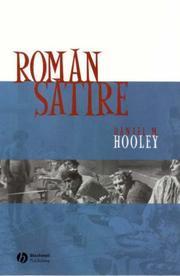
ISBN: 1405106891 9781405106894 9781405106887 1405106883 0470776269 9786611310998 1281310999 0470777087 Year: 2007 Volume: *3 Publisher: Oxford Blackwell
Abstract | Keywords | Export | Availability | Bookmark
 Loading...
Loading...Choose an application
- Reference Manager
- EndNote
- RefWorks (Direct export to RefWorks)
Satire, Latin --- History and criticism. --- History and criticism --- Satire, Latin - History and criticism.
Book
ISBN: 9780521671101 9780521854917 0521671108 0521854911 Year: 2014 Publisher: Cambridge Cambridge university press
Abstract | Keywords | Export | Availability | Bookmark
 Loading...
Loading...Choose an application
- Reference Manager
- EndNote
- RefWorks (Direct export to RefWorks)
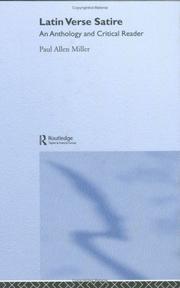
ISBN: 0415317169 0415317150 9780415317160 9780415317153 Year: 2005 Publisher: London Routledge
Abstract | Keywords | Export | Availability | Bookmark
 Loading...
Loading...Choose an application
- Reference Manager
- EndNote
- RefWorks (Direct export to RefWorks)
Verse satire, Latin --- Verse satire, Latin. --- History and criticism. --- Latin verse satire --- Latin poetry --- History and criticism --- Verse satire, Latin - History and criticism
Book
ISBN: 9781405156875 1405156872 1118451376 1118556631 1118902351 1282026283 1444306065 1444306073 9786612026287 Year: 2009 Publisher: Malden Wiley-Blackwell
Abstract | Keywords | Export | Availability | Bookmark
 Loading...
Loading...Choose an application
- Reference Manager
- EndNote
- RefWorks (Direct export to RefWorks)
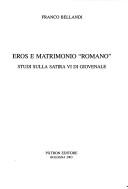
ISBN: 8855527207 9788855527200 Year: 2003 Volume: 77 Publisher: Bologna Pàtron
Abstract | Keywords | Export | Availability | Bookmark
 Loading...
Loading...Choose an application
- Reference Manager
- EndNote
- RefWorks (Direct export to RefWorks)
Verse satire, Latin --- Marriage in literature --- Sex in literature --- History and criticism --- Juvenal --- Juvenal. --- Verse satire, Latin - History and criticism --- Juvenal - Satura 6
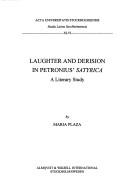
ISBN: 9122018913 9789122018919 Year: 2000 Volume: 46 Publisher: Stockholm : Almqvist & Wiksell,
Abstract | Keywords | Export | Availability | Bookmark
 Loading...
Loading...Choose an application
- Reference Manager
- EndNote
- RefWorks (Direct export to RefWorks)
Satire, Latin --- Laughter in literature. --- History and criticism. --- Petronius Arbiter. --- Rome --- In literature. --- Laughter in literature --- History and criticism --- Maderna, Bruno. --- Satire, Latin - History and criticism.
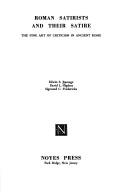
ISBN: 0815550286 9780815550280 Year: 1974 Publisher: Park Ridge, N.J. Noyes
Abstract | Keywords | Export | Availability | Bookmark
 Loading...
Loading...Choose an application
- Reference Manager
- EndNote
- RefWorks (Direct export to RefWorks)
Classical Latin literature --- Satire, Latin --- Satire latine --- History and criticism --- Histoire et critique --- Rome in literature --- -877 --- Latin satire --- Latin wit and humor --- Literature Latin Humor and satire --- History and criticism. --- Rome --- In literature. --- 877 --- Satire, Latin - History and criticism
Book
ISBN: 9782870312704 2870312709 Year: 2011 Volume: 329 Publisher: Bruxelles : Éditions Latomus,
Abstract | Keywords | Export | Availability | Bookmark
 Loading...
Loading...Choose an application
- Reference Manager
- EndNote
- RefWorks (Direct export to RefWorks)
Verse satire, Latin --- Poésie satirique latine --- History and criticism. --- Histoire et critique --- Juvenal. --- History and criticism --- Poésie satirique latine --- Juvenal --- Criticism and interpretation --- Verse satire [Latin ] --- Verse satire, Latin - History and criticism --- Juvénal (0060?-0130?). satires
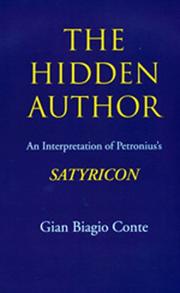
ISBN: 0520918509 0585160244 9780520918504 9780585160245 0520207157 9780520207158 Year: 1996 Volume: v. 60 Publisher: Berkeley (CA) : University of California Press,
Abstract | Keywords | Export | Availability | Bookmark
 Loading...
Loading...Choose an application
- Reference Manager
- EndNote
- RefWorks (Direct export to RefWorks)
"Petronius's Satyricon is famous today primarily for the amazing banquet tale, "Trimalchio's Feast," also celebrated in Fellini's film, Satyricon. But this episode is only one part of the larger picture offered by the work." "In The Hidden Author, Professor Conte starts with the structure of the work as a whole, inviting the reader to appreciate the elements of irony and fantasy woven into the text. The author has hidden himself with the aim of striking at the vanity of the contemporary cultured scene, handing over his stage to his characters, who are living in various sorts of degradation, but who see themselves, in minds overactively appropriating a great literary heritage, as figures of mythic proportions. In the foreground of Petronius's work can be seen the follies and excesses of the Rome of Nero's time; in the background, the outlines of the intellectual life of the early Empire."--BOOK JACKET.
Satire, Latin --- Greek & Latin Languages & Literatures --- Languages & Literatures --- History and criticism. --- History and criticism --- Petronius Arbiter. --- Maderna, Bruno. --- Rome --- In literature. --- Satire latine --- Histoire et critique --- Rome dans la littérature --- In literature --- Satire, Latin - History and criticism.
Book
ISBN: 9780226241845 9780226241982 133619037X 022624184X 022624198X Year: 2015 Publisher: Chicago University of Chicago press
Abstract | Keywords | Export | Availability | Bookmark
 Loading...
Loading...Choose an application
- Reference Manager
- EndNote
- RefWorks (Direct export to RefWorks)
The Roman poet and satirist Persius (34–62 CE) was unique among his peers for lampooning literary and social conventions from a distinctly Stoic point of view. A curious amalgam of mocking wit and philosophy, his Satires are rife with violent metaphors and unpleasant imagery and show little concern for the reader's enjoyment or understanding. In Persius, Shadi Bartsch explores this Stoic framework and argues that Persius sets his own bizarre metaphors of food, digestion, and sexuality against more appealing imagery to show that the latter—and the poetry containing it—harms rather than helps its audience. Ultimately, he encourages us to abandon metaphor altogether in favor of the non-emotive abstract truths of Stoic philosophy, to live in a world where neither alluring poetry, nor rich food, nor sexual charm play a role in philosophical teaching.
Food in literature. --- Persius --- Themes, motives. --- Philosophy. --- Language. --- Persius -- Language. --- Persius -- Philosophy. --- Persius -- Themes, motives. --- Satire, Latin -- History and criticism. --- Satire, Latin -- Themes, motives. --- Food in literature --- Satire, Latin --- Languages & Literatures --- Greek & Latin Languages & Literatures --- Latin satire --- Latin wit and humor --- History and criticism --- Themes, motives --- Persjusz Flakkus, Aulus --- Perse --- Persius Flaccus, Aulus --- Flaccus, Aulus Persius --- Persius, Paulus Flaccus --- Persio --- Aulus Persius Flaccus Volateris --- E-books --- Persius -- Language --- Persius -- Philosophy --- Persius -- Themes, motives --- Satire, Latin -- History and criticism --- Satire, Latin -- Themes, motives
| Listing 1 - 10 of 48 | << page >> |
Sort by
|

 Search
Search Feedback
Feedback About UniCat
About UniCat  Help
Help News
News